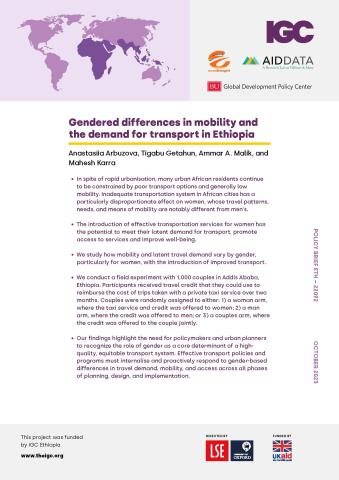Gendered differences in mobility and the demand for transport in Ethiopia
A study in urban Ethiopia reveals gender disparities in mobility. Introducing improved transport for women meets latent demand, enhances access, and underscores the need for gender-sensitive transport policies in planning and implementation.
-
Arbuzova et al Policy brief October 2023
PDF document • 3.55 MB
- In spite of rapid urbanisation, many urban African residents continue to be constrained by poor transport options and generally low mobility. Inadequate transportation system in African cities has a particularly disproportionate effect on women, whose travel patterns, needs, and means of mobility are notably different from men’s.
- The introduction of effective transportation services for women has the potential to meet their latent demand for transport, promote access to services and improve well-being.
- We study how mobility and latent travel demand vary by gender, particularly for women, with the introduction of improved transport.
- We conduct a field experiment with 1,000 couples in Addis Ababa, Ethiopia. Participants received travel credit that they could use to reimburse the cost of trips taken with a private taxi service over two months. Couples were randomly assigned to either: 1) a woman arm, where the taxi service and credit was offered to women; 2) a man arm, where the credit was offered to men; or 3) a couples arm, where the credit was offered to the couple jointly.
- Our findings highlight the need for policymakers and urban planners to recognize the role of gender as a core determinant of a high-quality, equitable transport system. Effective transport policies and programs must internalise and proactively respond to gender-based differences in travel demand, mobility, and access across all phases of planning, design, and implementation.






